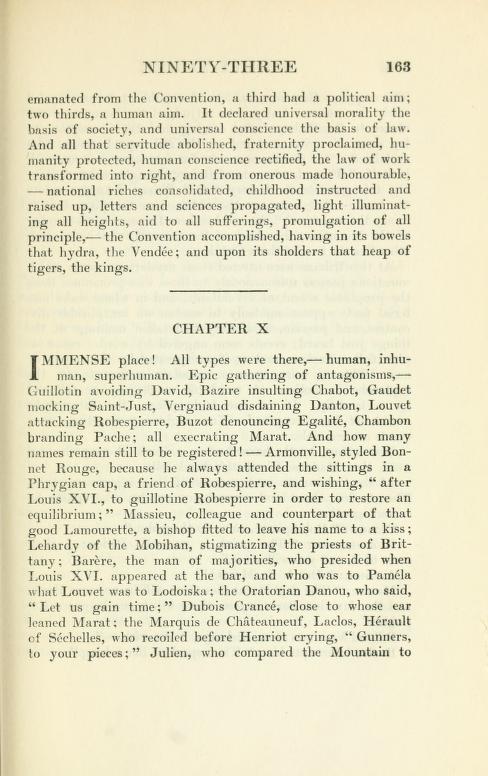Hugo, Ninety–Three
Annotation
Victor Hugo (1802–85) was an ardent republican and defender of the revolutionary legacy who went into exile during the Second Empire (1852–70). He lived long enough to become an icon of the Third Republic. He portrayed the democratic aspects of the Revolution in glowing, indeed somewhat romanticized terms.
This source is a part of the Legacies of the Revolution source collection.
Text
At the same time that it threw off revolution, this Assembly produced civilization. Furnace, but forge too. In this caldron, where terror bubbled, progress fermented. Out of this chaos of shadow, this tumultuous flight of clouds, spread immense rays of light parallel to the eternal laws,—rays that have remained on the horizon, visible forever in the heaven of the peoples, and which are, one, Justice; another, Tolerance; another, Goodness; another, Right; another, Truth; another, Love.
The Convention promulgated this grand axiom: "The liberty of each citizen ends where the liberty of another citizen commences,"—which comprises in two lines all human social law. It declared indigence sacred; it declared infirmity sacred in the blind and the deaf and dumb, who became wards of the State; maternity sacred in the girl-mother, whom it consoled and lifted up; infancy sacred in the orphan, whom it caused to be adopted by the country; innocence sacred in the accused who was acquitted, whom it indemnified. It branded the slave-trade; it abolished slavery. It proclaimed civic joint responsibility. It decreed gratuitous instruction. It organized national education by the normal school of Paris; central schools in the chief towns; primary schools in the communes. It created the academies of music and the museums. It decreed the unity of the Code, the unity of weights and measures, and the unity of calculation by the decimal system. It established the finances of France, and caused public credit to succeed to the long monarchical bankruptcy. It put the telegraph in operation. To old age it gave endowed almshouses; to sickness, purified hospitals; to instruction, the Polytechnic School; to science, the Bureau of Longitudes; to human intellect, the Institute. At the same time that it was national it was cosmopolitan. Of the eleven-thousand two-hundred and ten decrees which emanated from the Convention, a third had a political aim; two-thirds, a human aim. It declared universal morality the basis of society, and universal conscience the basis of law. And all that servitude abolished, fraternity proclaimed, humanity protected, human conscience rectified, the law of work transformed into right, and from onerous made honorable,—national riches consolidated, childhood instructed and raised up, letters and sciences propagated, light illuminating, all heights, aid to all sufferings, promulgation of all principle,—the Convention accomplished, having in its bowels that hydra, the Vendée; and upon its shoulders that heap of tigers, the kings.

